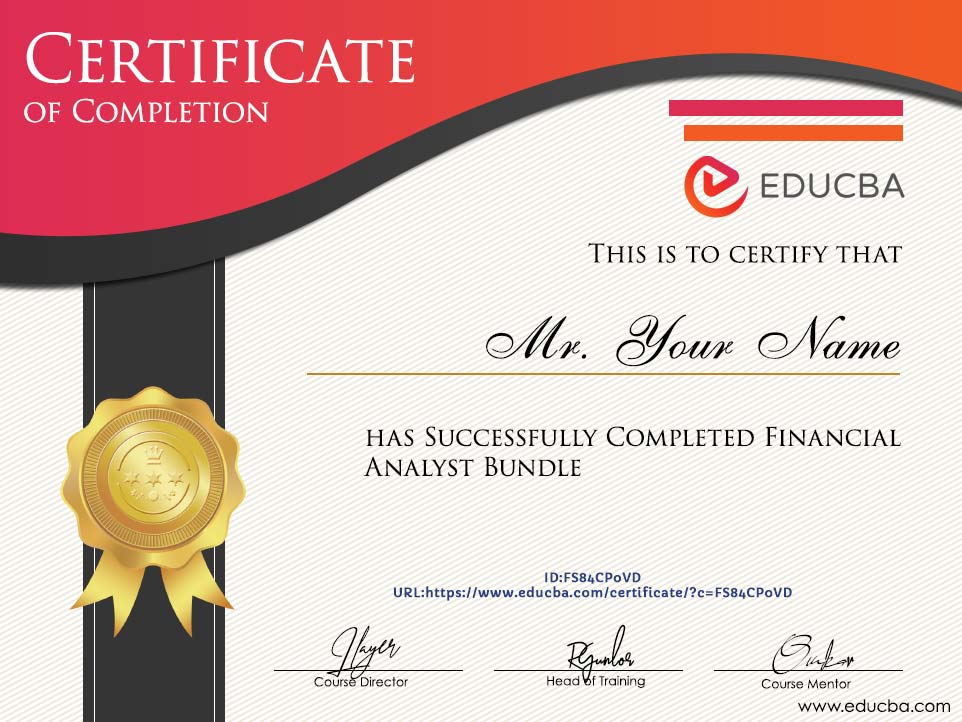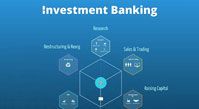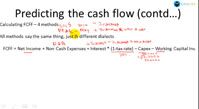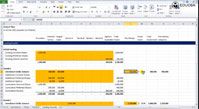Early Bird Offer

Best Seller Financial Analyst Bootcamp Live Class
Our All-in-one Financial Analyst Training Program provides you access to all our 48 hours Bootcamp that includes Investment Banking, Equity Research, Valuations, M&A, LBO, Private Equity, and Venture Capital. In addition, you get access to our very comprehensive self-study package that comes with 1000+ hours of video courses. This program will help you master the nuances of becoming a world-class Financial Analyst.
Includes:
- 133,754 ratings
Key Features
Early Bird Offer Ends in:
$1999
Course Fees
Live Online Classes PREFERRED
Everything in self-paced, plus
Overview
Our Live Online Training covers more than 48 hours of comprehensive, interactive, and instructor-led training with real-life case studies, thus imparting working knowledge of crucial financial principles.
Live Online Classes Curriculum Download Curriculum
-
Module 01 – Ratio Analysis - Fundamental Analysis Bootcamp
How to analyze a company?
- Common size statements
- Balance sheet
- Income statement
- Internal liquidity analysis
- Current ratio / quick ratio / cash ratio
- Inventory turnover
- Receivable turnover
- Payables turnover
- Operating profitability analysis
- Gross profit margins
- Operating margins
- Return on total capital
- DuPont analysis - Return on equity
- Extended DuPont analysis
- Risk analysis
- Operating leverage
- Financial leverage
- Debt to equity ratio
- Interest coverage ratio
- Growth analysis
- Sustainable growth rate
- Colgate Case Study
- Common size statements
-
Module 02 – Financial Modeling - Fundamental Analysis Bootcamp
- Introduction to financial modeling
- Why financial models are used?
- What skills are needed for financial modeling?
- General structure and model design
- Historical data
- Sources of information
- Presentation of historical data
- Analysis of historical data
- Building the model
- Core statements
- Revenues
- Costs
- Fixed asset, capital expenditure, and depreciation schedule
- Capital lease schedule
- Amortization schedule
- Working capital and change in working capital schedule
- Completion of income statement logic
- Shareholders’ equity schedule
- Shares outstanding schedule
- Individual schedules of inventory, deferred revenue, receivables, and other working capital categories
- Other long-term items schedule
- Debt and debt repayment schedule
- Interest schedule
- Income tax schedule
- Schedules of investments and dividends received
- Details of minority and non-consolidated subsidiaries
- Income statement drivers
- Revenues
- Costs
- Operating expenses
- Other income statement items
- Income taxes
- Equity income
- Minority interest
- Balance sheet drivers - assets
- Working capital
- Cash and cash equivalents
- Accounts receivables
- Inventories
- Fixed assets (PPE, depreciation and net fixed assets)
- Non-consolidated subsidiaries
- Balance sheet drivers – liabilities
- Short term debt
- Accounts payable
- Deferred taxes, accrued liabilities, and other current Liabilities
- Minority interest
- Equity
- Balancing the balance sheet
- Calculating cash flow from operations
- Calculating cash flow from investing activities
- Calculating cash from financing activities
- Calculating net cash flows
- Colgate Case Study
Introduction to Modeling
Projecting Schedules
Drivers
Balancing Act
CASE STUDY
- Introduction to financial modeling
-
Module 03 – Business Valuation - Business Valuation Bootcamp
Valuation Overview
- Valuation Overview
- Why valuation?
- Importance of valuation
- Valuation approach
- Key valuation tools
- Valuation summary table
- Key valuation questions
- Valuation – subjectivity versus objectivity
- Introduction to discounted cash flow
- Discounted cash flow
- Overview of discounted cash flow
- Steps in a Discounted cash flow (DCF)
- Free cash flow
- Valuing a firm using free cash flow to firm (FCFF)
- Valuing a Firm using free cash flow to equity (FCFE)
- Suitability of FCFF and FCFE
- Discounted cash flow projections
- Sales
- Operating expenses
- Depreciation
- Capital expenditure
- Income tax
- Working capital
- Deferred tax
- Projections – some questions?
- Terminal Value
- Terminal value overview
- Exit value method
- Exit multiple exercise
- Perpetuity growth method
- Perpetuity growth exercise
- Terminal value spot check
- Terminal value concerns
- Discount rate overview
- Discount rate – cost of debt
- Yield to maturity method
- Credit rating method
- Synthetic rating method
- Company report method (spot check!)
- Risks
- Unsystematic risk
- Systematic risk
- Introduction to capital asset pricing model (CAPM)
- Risk-free rate
- Beta
- Calculation of regression beta
- Calculation of bottom-up beta – levered and unlevered beta
- Beta concern
- Preferred beta methodology
- Market risk premium
- Historical risk premium method
- Forecast risk premium method
- Market risk premium: size premium
- DCF – present value
- Discounting
- Mid-year discounting
- Valuation
- Sensitivity analysis
- FCF and terminal value using growth rate and WACC as inputs
- Enterprise value using growth rate and WACC as inputs
- Price/share using growth and WACC as inputs
- Effect on EPS by changing the value drivers
- What is a multiple?
- Why multiples vary
- Advantages and disadvantages of Multiples
- Identifying comparables
- Operational parameters
- Financial parameters
- Equity value
- Enterprise value
- Advantages of equity value and enterprise value
- Introduction to equity value multiples
- Introduction to enterprise value multiples
- Calculation of valuation multiples
- Enterprise value multiples
- EV/Sales
- EV/EBITDA
- EV/EBIT
- EV/FCF
- EV/Capacity
- Equity value multiples
- P/E
- P/CF
- P/BV
- PEG
- Dividend Yield
- Let’s put it together!
- Asset-based valuation
- Sum of parts
- Mergers and acquisitions comparables
- Replacement cost method
- Qualitative factors in valuation - management quality
Discounted Cash Flows
Discount Rate
Capital Asset Pricing Model
DCF Synthesis
Valuation Multiple
Equity and Enterprise Multiple
Other Valuation Approaches
- Valuation Overview
-
Module 04 – Mergers & Acquisitions - Mergers & Acquisitions Bootcamp
- Overview of Mergers & Acquisition
- Purchase Price Calculations & Sources
- Purchase Price Calculations
- Sources & Uses of Funds
- Financial Statements
- Purchase Price Allocation
- Proforma Opening Balance Sheet Format
- Proforma P&L Forecast
- Proforma NI & EPS
- Proforma Balance Sheet Actuals & Forecast
- Working Capital Calculations
- Proforma Statement Completion
- Preparation of Proforma Cash Flow Statement
- Debt Repayment Schedule
- Accretion & Dilution Calculations
- Synergies and Assumptions
- Synergy Assumptions
- Synergy Calculations
- Sensitivity Analysis
- Summary
-
Module 05 – Leveraged Buyout - Leveraged Buyout Bootcamp
- Overview of Leverage Buyout
- Transaction Assumptions
- Transaction Assumptions
- Debt Assumptions
- Sources & Uses of Funds
- Projecting Schedules
- Revenue Built-up
- Cost Sheet
- Working Capital Management
- Depreciation & Amortization
- Linking to Financial Statements
- Linking to Income Statement
- Linking to Balance Sheet
- Linking to cash Flow Statement
- Shareholder’s Equity & Debt Schedule Calculations
- Shareholder’s Equity Schedule
- Debt Schedule
- Completing the Missing Links
- IRR & Sensitivity Analysis
-
Module 06 – Private Equity - Private Equity Bootcamp
- Overview of Private Equity
- PE Structure
- Basic Structure
- Deal Structuring
- Pre and Post Money
- Effective Share Price
- PE Strategies
- Venture Capital
- Growth Capital
- Leverage Buyouts
- Private Equity Investments
- PE Fund
- General Partner
- Parallel Funds
- Feeder Funds
- Capital Commitments
- Distribution Waterfall
- Carried Interest and Catch Up
- Claw Back
- Fund Fees
- Fund Expenses and Marketing
- Fund Closing and Fund Term
- Building the Model
-
Module 07 – Venture Capital - Venture Capital Bootcamp
- Lifecycle of Venture Capital
- Company Valuation and Money Valuation
- Structure
- Pre and post Money Calculation
- Capitalization Table
- Calculating Investor Return
- Calculating Investor Return
- Return Analysis & Total Equity Valuation
- Return Analysis Total Equity Valuation
- IRR Calculation
- Internal Rate of Returns Calculation
- Free Cash Flow Calculations
IN : +91-8800880140
Self-Paced Training
Our Self-paced Financial Analyst Training is an Ultimate bundle of 250+ courses with 1000+ hours of video tutorials and Lifetime Access.
This isn’t all, you also get verifiable certificates (unique certification number and your unique URL) when you complete these trainings.
Self-Paced Training Curriculum Download Curriculum
In this section, each module of the Financial Analyst course is explained briefly:
-
Investment Banking Course
(117 Online Courses, 25 Hands-on Projects)
We start with overview of the investment banking and then we will start with excel training . Then we learn financial statements, corporate valuation, discounted cash flow, comprehensive relative valuation training, financial modeling, merger modeling, VBA, Macros, LBO, Private Equity, Advanced Accounting, and a lot more.
-
Financial Modeling Course
(3 Online Courses, 14 Hands-on Projects)
In this Financial Analyst course, you will learn everything you need to know about financial modeling. We will start with the financial modeling of Siemens AG. Then, we will teach you the financial modeling of banking sector, for a biotech company, petrochemical sector, real estate sector, metals sector, Islamic banking modeling, consumer goods and many other.
-
Equity Research Training
(15 Online Courses, 55+ Hours)
We will start this Financial Analyst course with Microsoft Excel, basic and advanced modules. Then, we will talk about financial statements. Next, you will learn about corporate valuation, financial modeling, discounted cash flow, relative valuation training, and equity research report writing.
-
Private Equity Training
(15 Online Courses, 37+ Hours)
We will start this Financial Analyst course again with the MS Excel basic and advanced modules. And then, you will learn about the financial statement analysis, discounted cash flow analysis, financial modeling of Siemens AG, private equity, private equity modeling tutorials, LBO Modeling of Siemens etc.
-
Business Valuation Training
(14 Online Courses, 70+ Hours)
In this Financial Analyst course, we will start with the corporate valuation from beginner to pro in MS Excel. Then, we will talk about DCF, comprehensive relative valuation training, Comparable Companies Valuation, Real Estate Financial Modeling, Financial Modeling of Indian Telecommunication Sector, Automobile Sector
-
Mergers & Acquisition Course (with M&A Projects)
(5 Online Courses, 24+ Hours)
We will start this Financial Analyst course with the Merger Modeling of Albemarle Corp and Axiall Chemicals. Then, we will teach you the Hannifin & Clarcor Merger Modeling Case Study, Comcast & Time Warner Merger Modeling Training, Reverse Merger Modeling & Valuation, and lastly, Spin-offs De-Merger Modeling.
-
Venture Capital Course (with Case Studies)
(2 Online Courses, 7+ Hours)
In this Financial Analyst course, you will typically learn two modules. First, you will learn about venture capital modeling. And then, we will teach you a module on the advanced venture capital modeling.
Self Study Course Bundle Details
| Bundle | No. of Courses | No. of Projects | Hours | Actual Price |
|---|---|---|---|---|
| Banking Operations and Management Masterclass - Specialization | 10 Course Series | 46+ | - | + | |
| Behavioral Finance Mastery: Decoding Financial Behavior - Specialization | 6 Course Series | 25+ | - | + | |
| INVESTMENT BANKING - Specialization | 162 Course Series | 58 Mock Tests | 569+ | - | + | |
| FINANCIAL MODELING & VALUATION - Specialization | 51 Course Series | 30 Mock Tests | 280+ | - | + | |
| FOREX TRADING - Specialization | 5 Course Series | 3 Mock Tests | 29+ | - | + | |
| EQUITY RESEARCH ANALYST - Specialization | 23 Course Series | 8 Mock Tests | 94+ | - | + | |
| QUICKBOOKS - Specialization | 3 Course Series | 8+ | - | + | |
| FINANCE for NON FINANCE - Specialization | 19 Course Series | 6 Mock Tests | 48+ | - | + | |
| MS EXCEL Course for All | 135+ | - | + | |
| PROJECT FINANCE - Specialization | 13 Course Series | 5 Mock Tests | 40+ | - | + | |
| CRYPTOCURRENCY - Specialization | 9 Course Series | 54+ | - | + | |
| HEDGE FUND MASTERY - Specialization | 9 Course Series | 3 Mock Tests | 23+ | - | + | |
| COST ACCOUNTING - Specialization | 5 Course Series | 16+ | - | + | |
| PRIVATE EQUITY - Specialization | 26 Course Series | 3 Mock Tests | 97+ | - | + | |
| CREDIT RISK - Specialization | 18 Course Series | 6 Mock Tests | 65+ | - | + | |
| COMPANY VALUATION & MODELING - Specialization | 19 Course Series | 9 Mock Tests | 108+ | - | + | |
| CORPORATE FINANCE - Specialization | 29 Course Series | 16 Mock Tests | 100+ | - | + | |
| VENTURE CAPITAL - Specialization | 2 Course Series | 3 Mock Tests | 7+ | - | + | |
| FINANCIAL ANALYTICS in R - Specialization | 5 Course Series | 10+ | - | + | |
| FIXED INCOME - Specialization | 9 Course Series | 3 Mock Tests | 34+ | - | + | |
| FINANCIAL ACCOUNTING - Specialization | 44 Course Series | 3 Mock Tests | 156+ | - | + | |
| METATRADER - Specialization | 5 Course Series | 29+ | - | + | |
| MERGERS & ACQUISITIONS - Specialization | 5 Course Series | 3 Mock Tests | 21+ | - | + | |
| LBO LEVERAGE BUYOUTS - Specialization | 4 Course Series | 3 Mock Tests | 13+ | - | + | |
| FIXED INCOME MATHEMATICS - Specialization | 2 Course Series | 9+ | - | + | |
| BOND TRADING Course | 3+ | - | + | |
| MUTUAL FUNDS - Specialization | 7 Course Series | 3 Mock Tests | 18+ | - | + | |
| GST - Specialization | 10 Course Series | 18+ | - | + | |
| Excel Advanced Training | 146+ | - | + | |
| Investment Banking Operations - Learning Path | 8 Course Series | 3 Mock Tests | 20+ | - | + | |
| BOOKKEEPING Course | 3+ | - | + | |
| Banking Financial Modeling - Learning Path | 5 Course Series | 25+ | - | + | |
| Financial Budgeting - Learning Path | 4 Course Series | 17+ | - | + | |
| VBA MACROS - Specialization | 18 Course Series | 13 Mock Tests | 43+ | - | + | |
| Bonus Finance Courses | 3240+ | - | FREE | |
| Total | 6133+ | 0+ |
Self Study Projects
- 40+ Industry Projects
- Hands-on Instructor-led Case Studies
- Perform financial analysis on Live company data
- Build a financial & Valuation Model from scratch
- Forecast Target Price of Shares
- Showcase Projects in your CV/Linkedin
Financial Analyst Course - Certificate of Completion

Industry Growth Trend
The wealth management platform market was valued at USD 1.52 Billion in 2016 and is projected to reach USD 3.20 Billion by 2022, at a CAGR of 13.4% during the forecast period. The base year considered for this report is 2016, and the forecast period is 2017–2022.[Source - MarketsandMarkets]
Average Salary
[Source - Indeed]
What tangible skills will I learn from this course?
To begin with, you will learn loads of skills from this course. If you keep a score, you would see there are more 50+ skills you will learn in this Financial Analyst course. For your reference, we’re presenting a vital few –
- Financial modeling & valuation: This is a big skill-set that you will learn in this course. It takes years for a finance professional to master these two. You will get them in an easy-to-digest format so that you can practice and get there faster.
- MS Excel, VBA, Macro: You need all three for financial analysis, financial modeling, and data analytics. You will learn these three here too.
- IFRS & US GAAP: If you’re working as an accountant or a finance manager, you should be thorough with both IFRS and US GAAP. You will learn both of these in detail in this Financial Analyst course.
- Hedge Fund & Project Finance: Again, two of the most important modules of finance you will learn in this Financial Analyst course.
- Cryptocurrency: This is the latest finance technology that you should know about and we cover this in detail in this course as well.
Pre-requisites
- Willingness to dive into the world of finance: This Financial Analyst course is huge. And it covers everything you can think of under the finance domain. If you’re not willing to put in time, effort, and practice, it won’t be easier to tackle. But if you’re interested, you can do one course at a time and within a solid block of time, you would be able to do the entire course.
- A basic interest/knowledge in becoming a master of finance: This Financial Analyst course will make you a master of finance. A little knowledge would help you become interested and learn more about the beautiful world of finance.
Target Audience
- We want to say that this course is for everybody if anyone is interested. But it’s more applicable to –
- Students of Finance: If you are studying finance, it would be an invaluable resource for you.
- Finance professionals: If you’re a working professional and want to grow in your career in Finance, this Financial Analyst course would be adding immense value to your financial acumen.
FAQ’s- General Questions
Why should I do this Financial Analyst Course?
By looking at the gigantic volume of this course, be ensured that there’s no reason for not doing this course.
I’m not from a finance background. Can I do this Financial Analyst Course?
You surely can and you should if you’re interested. Start with the ‘finance for non-finance managers’ module to begin with.
How would I make time for this comprehensive course?
The idea is to find a bite-size time for each course. You can decide to do one course, let’s say MS Excel in a week. And find an hour or two on the weekdays and a few hours at the weekend to get the course done.
Sample Preview
Career Benefits
- You will be well-equipped to handle any finance-challenge in your career: This course will build your financial acumen to the maximum. After doing this course, you will be considered as one of the dictionaries of finance.
- You will be able to get promotion and get better at what you do: This course will help you apply the nitty-gritty of financial concepts into the practical world. As a result, you will directly or indirectly be benefitted from the knowledge & application.
Course Testimonials

Good Financial Analyst Course!
Hey Dheeraj, Sincerely, I will be very sad if you stop your wonderful work. I am browsing on your blog since 2016 and I can ensure you that it has been very helpful and relevant in helping me to join my current position as Investment Manager with private equity funds. Your approach to address issues is very simple and digest. Each topic and course summarized is a real library for students and also professionals like me searching to refresh their knowledge. As evidence, I got a certificate from EDUCBA for the Financial Analyst Course to certify my involvement and commitment to continuous learning. My current employer was very happy and encouraged me at reading and follow your blog. Today, friends of mine and workmates are also engaged at following your great job. Don’t stop and continue to provide what you do. You are the best. Thanks a lot for all and good continuation.
Linked
Malan Alexis KOUAME

Amazing learning experience
Hey! I am a seasoned finance analyst; however I often check something on your site. I like the way you describe complicated matters: amazingly clear, focused and well-covered. Way to go!
Linked
Vladimir

Great Work
One of the most comprehensive tutorial website for finance professionals. Two thumbs up. Keep up the good work and please let the knowledge flow!!!
Linked
Yasser Zafar

Perfect Course
I find the tutorials to be an invaluable resource for my better students and a sanity check for my classroom teaching.
Linked
Sidney Bostian

Good Learning
My interest in finance manifested after I completed the first semester of master’s in management studies. It took time to understand the industry. I could not differentiate between finance and accounting. It took time to realize the importance of capital markets in the modern economy. Since the time I started my internship, I have been reading from your blog to obtain expertise in financial modeling. I have purchased your Financial Analyst Course bundle and it has been a blessing to be able to discover your knowledge domain. I hope you will continue to provide your services. I follow capitalist ideology so I would suggest you to monetize your services and target niche student population.
Linked
Shaikh Yunus

Good lectures
It’s been great, I have never been so fortunate to receive the help of this nature. Although data prices are high in South Africa, I went all out to getting a connection and watching the online videos whilst making notes. I am not a finance major but I have put it on upon myself to read up on and learn as much as I can. This course has it wonderfully summarised and explains all that new analysts should know in the business of financial modeling and the general environment in the industry. Because of this course my confidence has improved drastically over the past month. I think osmosis also has a role to play here and I also must confess that the course came at a time when I had already made a lot of learning yards through the WallStreetMojo blog. Give yourself 8 intense weeks of studying and I think the course will benefit you greatly indeed.
Linked
Njabulo Vincent Hadebe

Perfect
Regarding Equity Research, Investment Banking, I have never seen such interesting courses, (in terms of analysis and explanation). I recommend WallStreetMojo to all my friends working in the Asset Management Industry. Thank you very much for your website. Antoine Bietrix (Young Graduate, Looking for a first job as Equity Research Analyst, Past Intern at Jabre Capital Partners, Edmond de Rothschild Private Banking, Oddo BHF Asset Management)
Linked
Beatrix Antoine

Financial Analyst Bundle
I have enrolled for an investment banking course some time ago and I enjoyed it very much. I frequently repost your posts to my LinkedIn network. I use a lot it the material provided at your blog to my valuation class at the American College of Greece (Degree). Generally speaking they are helping a lot of people dealing with financial modeling and valuations. Many thanks for your great work.
Linked
Samonas Michael


















